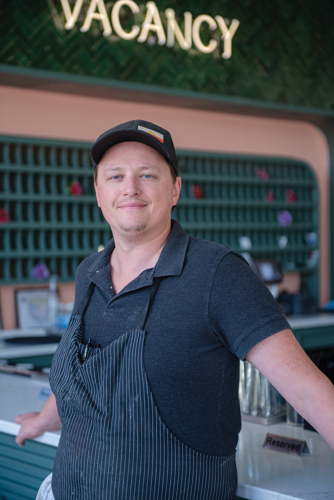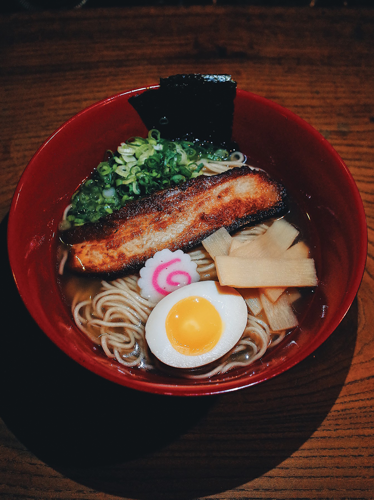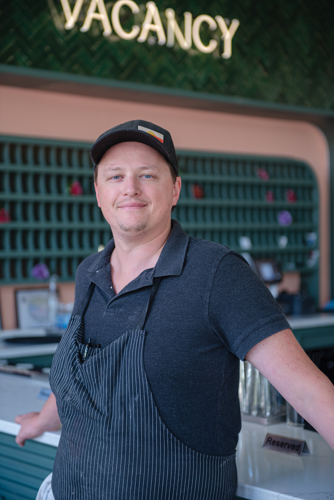
Black Dynasty Secret Ramen House
Conventional wisdom says food trucks and pop-ups all aspire to move up to bricks-and-mortar restaurants someday, and when they finally receive the keys to their permanent locations, they’ll have reached the pinnacle of success. But in these Coronatimes, that old trope is no longer necessarily the case.
Pop-ups can exist in many forms: true guerrilla culinary events that only insiders even know are happening; long-term guest stints inside existing restaurants; one-time events where chefs offer a different cuisine than what’s on their standard menus. As restaurants scramble to discover alternate revenue sources during the pandemic, pop-ups have emerged as opportunities that can represent the difference between survival and shuttering.
Pre-pandemic, Nick and Audra Guidry were on a trajectory toward world — or at least the 1000 block of Gallatin Avenue — domination with their successful Slow Hand Coffee + Bakeshop and latest venture, Pelican & Pig. Unfortunately, P&P’s model of open-fire cooking didn’t translate well with the current capacity-restrained regulations of hospitality or for to-go dining. Having been missed by the March tornado that devastated several of their neighbors, the couple scrambled to come up with a viable solution as restaurant doors began to reopen.
The answer came from an old friend, Hunter Briley. “Hunter is from Baton Rouge,” says Nick. “He helped out with the opening of Patrick’s Bistreaux, and it was always his dream to have his own po’boy shop, and he pitched it to us a few years ago. I’m originally from New Orleans, so we decided to give it a try.” The result was the Lagniappe Po’Boys pop-up, which Nick and Audra operated out of the Pelican & Pig space from late May until early August.
Their classic Big Easy sandwiches — like soft-shell crab, roast beef with debris and muffalettas served with a house-made olive salad — were extremely well-received, and Audra pitched in her considerable baking talents by creating pralines from a recipe that has been in Nick’s family for three generations. They also offered a real-deal gumbo that became a favorite among guests. “The gumbo has been crazy,” Nick notes. “We were making 20 gallons a week. I tried to substitute red beans and rice just to mix things up, but people wouldn’t have it!”
While Lagniappe was quite successful, it was never intended to be an ongoing venture, and the Guidrys shut it down at the beginning of August. “Pop-ups are a great temporary cash injection,” says Nick, “and Lagniappe was how we paid the bills during the interim. We’re still evaluating it and may look at doing it again in the future. But we asked our staff, and 100 percent of them were in favor of reopening Pelican & Pig, so that’s what we’re working toward.”
Downtown, a mysterious pop-up is moving forward in fits and starts. The Black Dynasty Secret Ramen House has been a favorite among in-the-know diners for a couple of years. The venture is operated by a young man named Rooney who is so self-effacing that he doesn’t want his full name used in this story — he says he wants to maintain a sense of mystery around the restaurant and cast the spotlight on the entire team that creates the menu at Black Dynasty.
The chef fell in love with ramen the same way as many others. “I ate a lot of Maruchan and Top Ramen, those $0.25 packs from Kroger,” Rooney says. “I knew it as working-class food until I started studying it after I saw the Momofuku cookbook. I discovered, ‘Oh, that’s something that takes a lot more time than I thought,’ and learned about Japanese ramen chefs. I was fascinated that there’s a whole culture of people so dedicated to one thing.”
After a job change to working as a line cook at Josephine, he moved forward. “Since I was only working 40 hours a week instead of 80, I found myself with a lot of extra time on my hands,” he says. “I started planning 10-seat, five-course dinners at my house with a few friends once a month. I really wanted to cook Japanese food with Southern sensibilities.”
Rooney intensified his study of ramen and discovered more things to love about it. “American diners have so many choices. People expect a chef to be able to cook anything. I prefer chefs who are artisans in one thing. I liked that there wasn’t the need to fluff the menu with bullshit, but it could still be chef-driven and chef-focused food. Ramen is honest, down-to-earth food.”
Black Dynasty struck a deal for a new permanent home operating out of the back of the quirky Bar Sovereign downtown at 514 Fifth Ave. South. To maintain the sense of mystery, Rooney used a lit red lantern in the bathroom hallway — the only way bar patrons knew that ramen was being served. Initial plans were to serve a simple menu of two bowls of ramen, one salad, gyoza and a dessert. After a few nights of trial runs, Bar Sovereign was temporarily closed, so Black Dynasty switched to a carryout-only model operating out of the alley behind the building.
As of Sunday, the chef and his team have moved back inside. “This offers the chance for stability and consistency, an opportunity to really see what we can do,” he explains. “It really is a group effort. The sous chef and line cooks help to write the recipes, and we meet to decide on the menu. They’re really invested and care a lot. We make everything in house, and we’re the only ramen shop in the state that makes our own noodles.”
Black Dynasty has officially moved past pop-up status, as Rooney avers, “I don’t have another job now — this is it!”

Jason Zygmont
Some would consider chef Jason Zygmont’s move from running the kitchen at The Treehouse to his own pop-up to be something of a step down, but he doesn’t see it that way. “When I found out that the owners of the restaurant were looking to sell, I knew I needed to make a change,” Zygmont recalls. “I had to figure out how to do what I wanted, which was to own and operate my own restaurant. I’m an expert at failing to open new restaurants, but I never thought I’d do the pop-up thing. Once I realized that I could do it fewer days a week with a smaller staff, it made sense.”
Zygmont began to move forward with Setsun, but first he needed a semi-permanent place to hang his toque: “I looked for a space that didn’t offer dinner service, and I found Sky Blue Cafe two blocks from where I live. It all happened pretty quickly. I sent an email to [Sky Blue’s info] address, and the owner Chad [Stuible] responded the next day. We took a quick tour together and agreed that I would rent it Friday through Monday. Chad is really the unsung hero of the whole story. Without him, this wouldn’t exist in the current space.”
That current space is at Vandyke Bed & Beverage, the boutique East Nashville hotel where Zygmont has taken over the food program on a permanent basis. After a year of working out of the Sky Blue kitchen creating an innovative menu of exotic vegetable-centric dishes ingeniously paired with natural wines, the chef was looking for a change. “The first three months of doing the pop-up was the hardest job I ever had,” he says. “I was cooking, doing the accounting, PR, HR and social media. We had to do all our prep work off site, so we essentially operated like a caterer. We were really flying by the seat of our pants.”
When the opportunity arose to plant roots at Vandyke, Zygmont jumped at the chance. “It’s a nicer space in the middle of Five Points with better foot traffic,” he says.
Setsun opened up for business the evening of March 2, a date with great significance. “We had one night of service and then went home to find out that a tornado had hit,” explains Zygmont. “And then, the global pandemic. To call it a setback would be an understatement.”
Since reopening in June, Setsun has provided an extra benefit to the landlords at Vandyke. Without a food program, they could not operate as just a bar under current regulations, denying hotel guests that amenity and the owners that revenue. Now the bar, which is operated by Vandyke while Setsun concentrates on the kitchen, can be open whenever Zygmont is serving dinner — from 5-10 p.m., plus during Sunday brunch service.
Carryout has become an important part of Setsun’s business. “I’m wary of sending some things to go,” Zygmont admits. “I’m not doing oysters for carryout, and you have to be aware that the chocolate souffle will basically be a chocolate brownie when it arrives. I didn’t get into this business to dump noodles into a brown paper box, but if you want it, I’ll cook you the best damned to-go food you’ve ever had!”
Zygmont is realistic about his current situation. “We’re essentially trying to survive this moment, treading water, but I count myself as very lucky,” he says. “We’re just trying to be safe and do what we love.”







